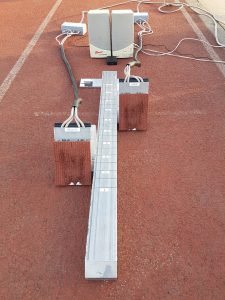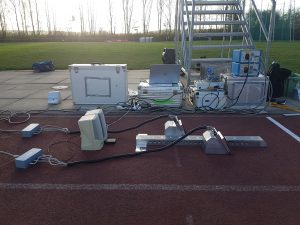Ashley Bagley
The effect of the bend on global kinetic and temporal variables during the block phase of the sprint start
The ISEA student Engagement Award was used to help subsidise my transport and accommodation costs while visiting German Sport University Cologne to loan custom-made instrumented starting blocks and corresponding software to be used for my 1st PhD study.
As a result of the trip, a collaboration is emerging with Dr Steffen Willwacher, firstly to investigate the differences between global kinetic (average external block power and ground reaction forces (GRFs) in all three planes of motion) and temporal (contact time in the blocks) variables during the block phase of the sprint start on the bend and the straight. Ten sprinters, all experienced in bend sprinting (200 m PBs ranged 21.40 – 23.20 s), completed three 10 m maximal effort sprints on the straight and three 10 m maximal effort sprints on the bend in lane 1 (radius 36.5 m). The sprinters all started from the instrumented starting blocks. Results showed that there were no differences in the performance variables including total push time and normalised average horizontal block power. For the front block, external force production in the vertical and resultant forces were significantly different. On the bend, the mediolateral forces in both blocks were directed more towards the centre of the track. The results demonstrated that in the starting blocks, the bend does not impact on performance variables but technique in applying force changes.
The study will be written up with the aim of it being published in the Journal of Sports Sciences. My abstract has also been accepted as a free communication presentation as the BASES Conference 2018 in Harrogate.
Dr Steffen Willwacher will be an external member of my PhD supervisory team. The opportunity to meet with the researchers and engineers at the German Sport University Cologne and discuss how novel sports engineering projects and collaborations might be developed further was a very valuable experience. I was also given the opportunity to speak at a seminar during the visit, a fantastic opportunity for feedback on my work. During the trip, I was shown around the University and their facilities, the starting blocks, the set-up and how to use the equipment.
The collaboration with Steffen allowed access to state-of-the-art equipment for data collection, which will advance our understanding of the reasons for performance decreases on the bend, compared with the straight. I would like to thank Steffen Willwacher and the ISEA for the opportunity to visit German Sport University Cologne, borrow the equipment and develop collaboration with an academic who is well published in another country. This has been valuable experience as I look towards completing my PhD.

